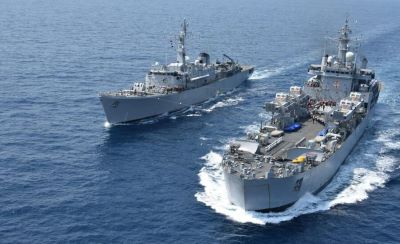Context-
India's commitment to enhancing maritime security in the Indian Ocean Region (IOR) is evident in its recent infrastructure development in Mauritius. This move underscores India's strategic interests and its proactive engagement in regional security dynamics. Here we explores the significance of India's endeavors in Agalega Island, Mauritius, and its implications for the broader geopolitical landscape.
Importance of Indian Ocean Region (IOR) for India:
- Energy security: Nearly 80% of India’s crude oil requirement is imported, which are mostly routed through the sea. Taking into account the total oil imports by sea, offshore oil production and petroleum exports, the country’s cumulative sea dependence for oil is estimated to be about 93%. Thus, IOR is very important to keep India’s oil route safe.
- Trade security: Today, almost 95% of India’s trade by volume and 68 per cent of trade by value are routed via the Indian Ocean. Any impediment to flow of commercial traffic would have disastrous ramifications on her economic objectives.
- Resources: India depends heavily on Indian Ocean resources for resources. Fishing and aquaculture industries are a major source of export as well as providing employment to more than 14 million people. Thus, securing presence in IOR is important for India.
- Security threats: Militarily, the presence of a long coastline makes India vulnerable to potential threats emerging from the sea. One of the worst terrorist attacks in Mumbai was perpetrated by terrorists arriving by sea. India’s nuclear installations, coastal cities are at continuous threat from state and non-state actors. Thus, keeping an eye on the sea is important.
- Piracy: The presence of non-traditional threats like piracy, smuggling, illegal fishing and human trafficking also present major challenges and hence, a secure Indian Ocean is key to securing India’s national interests. Multiple cases are reported in the past of drug smuggling near Gujarat coast, Mumbai coast etc.
Inauguration of Infrastructure in Agalega Island, Mauritius:
On February 29, 2024, Indian Prime Minister Narendra Modi and Mauritian Prime Minister Pravind Jugnauth jointly inaugurated a new airstrip and jetty, along with six India-assisted development projects in Agalega Island, Mauritius. This strategic location, 1,100 kilometers north of the main island of Mauritius, holds importance due to its proximity to Seychelles, the Maldives, the Chagos Islands, Madagascar, and the eastern coast of Africa. The infrastructure development is a demonstration of India's commitment to bolster its security presence in the region.
● Strategic Significance of Agalega Island:
Agalega Island's location is crucial, bordering Seychelles, the Maldives, Chagos Islands, and Madagascar. The island's vulnerability to piracy and the increasing presence of Chinese warships necessitated the development of infrastructure for enhanced security. The exclusive economic zone (EEZ) covering Agalega further amplifies its importance, making it imperative for India to address security challenges in the area.
● Historical Background and Project Initiation:
The concept of infrastructure development in Agalega was conceived in 2005, gaining formalization during Modi's 2015 visit to Mauritius. The comprehensive plan aimed at improving the runway, constructing a port, establishing intelligence and communication facilities, and implementing a transponder system for ship identification. Despite local protests raising concerns about national security compromises, construction began in 2019, reflecting India's determination to enhance regional maritime security.
● India's 'Security and Growth for All in the Region' (SAGAR) Policy:
In 2015, India introduced the SAGAR policy, signaling its commitment to strengthening maritime capabilities and expanding its influence in the IOR. The recently completed projects align with the SAGAR ethos, focusing on economic and security cooperation with maritime partners to combat piracy, terrorism, and illicit drug trade. Improved sea and air connectivity also benefit the residents of Agalega and facilitate refueling for Indian ships.
Countering China's Influence in the Region:
India's infrastructure development in Mauritius serves as a strategic move to counterbalance China's expanding influence in the IOR. China's naval base in Djibouti and its formidable maritime fleet pose challenges to India's security dominance. While India currently possesses fewer warships than China, the infrastructure in Mauritius enables it to establish itself as the region's net security provider, countering China's rapid expansion.
- Naval Capabilities and Challenges: India's naval capabilities, with approximately 130 warships compared to China's 350, are complemented by its focus on infrastructure development. Plans to expand the warship fleet to 200, including a third aircraft carrier, may face delays. However, the new airstrip in Mauritius allows India to deploy large P-8Is, strengthening its maritime presence and challenging China's dominance in the region.
- Balancing Naval Cooperation and Competition:
As India seeks to increase its influence in the IOR, maintaining a delicate balance in naval cooperation and competition becomes imperative. Collaborations with strategic partners like France and the United States are crucial in navigating the complex geopolitical landscape. Multi-aligned cooperation will play a pivotal role in ensuring India's emergence as a prominent maritime power and a representative of the Global South.
- Challenges and Future Outlook:
In the face of China's rising influence in the Indian Ocean, India must exercise caution and strategic acumen. Striking the right balance between cooperation and competition is essential for India to establish itself as a net security provider. Partnerships with key nations, especially France and the United States, will be instrumental in navigating geopolitical challenges and securing India's pre-eminence in maritime dominance.
Conclusion:
India's proactive engagement in Agalega Island, Mauritius, exemplifies its commitment to the 'Net Security Provider' role in the Indian Ocean Region. The strategic infrastructure developments align with the SAGAR policy, offering solutions to piracy, terrorism, and illicit activities. As India treads carefully amid increasing regional competition, its partnerships and strategic vision will determine its success in maintaining maritime dominance and countering external influences.
|
Probable questions for UPSC Mains Exam-
|
Source- ORF








